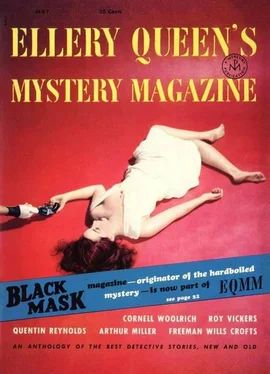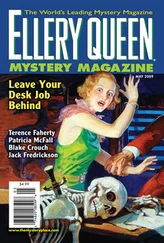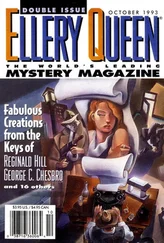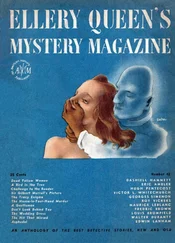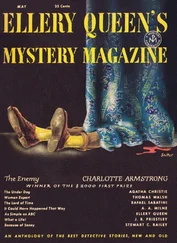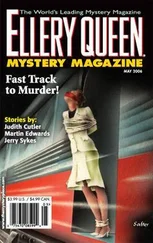Charles Child - Ellery Queen's Mystery Magazine, Vol. 21, No. 114, May 1953
Здесь есть возможность читать онлайн «Charles Child - Ellery Queen's Mystery Magazine, Vol. 21, No. 114, May 1953» весь текст электронной книги совершенно бесплатно (целиком полную версию без сокращений). В некоторых случаях можно слушать аудио, скачать через торрент в формате fb2 и присутствует краткое содержание. Город: New York, Год выпуска: 1953, Издательство: American Mercury, Жанр: Классический детектив, на английском языке. Описание произведения, (предисловие) а так же отзывы посетителей доступны на портале библиотеки ЛибКат.
- Название:Ellery Queen's Mystery Magazine, Vol. 21, No. 114, May 1953
- Автор:
- Издательство:American Mercury
- Жанр:
- Год:1953
- Город:New York
- ISBN:нет данных
- Рейтинг книги:4 / 5. Голосов: 1
-
Избранное:Добавить в избранное
- Отзывы:
-
Ваша оценка:
- 80
- 1
- 2
- 3
- 4
- 5
Ellery Queen's Mystery Magazine, Vol. 21, No. 114, May 1953: краткое содержание, описание и аннотация
Предлагаем к чтению аннотацию, описание, краткое содержание или предисловие (зависит от того, что написал сам автор книги «Ellery Queen's Mystery Magazine, Vol. 21, No. 114, May 1953»). Если вы не нашли необходимую информацию о книге — напишите в комментариях, мы постараемся отыскать её.
Ellery Queen's Mystery Magazine, Vol. 21, No. 114, May 1953 — читать онлайн бесплатно полную книгу (весь текст) целиком
Ниже представлен текст книги, разбитый по страницам. Система сохранения места последней прочитанной страницы, позволяет с удобством читать онлайн бесплатно книгу «Ellery Queen's Mystery Magazine, Vol. 21, No. 114, May 1953», без необходимости каждый раз заново искать на чём Вы остановились. Поставьте закладку, и сможете в любой момент перейти на страницу, на которой закончили чтение.
Интервал:
Закладка:
by Quentin Reynolds [2] Copyright, 1936, by Crowell-Collier
An “ unknown” stor y by Ouentin Reynolds , owe of the known and best loved writers of our time ... Mr. Reynolds — reporter, sports writer in the great tradition, foreign correspondent, editor, roving investigator, lecturer, radio and television commentator, novelist, movie scenarist, and recently a biographer — Quentin Reynolds, man of good will, faces the problems of our confused era and keeps growing; and although the demands on his talent and interests increase, he still manages to find time every once in a while to write in a medium which he deeply respects — the detective story.
There was no use trying to work. Those church bells kept chiming at minute intervals and, though they weren’t loud, they were insistent and their tones crept into the room and hung there, getting between me and any work. It was Friday in Berlin, and why church bells should be ringing on a Friday afternoon I couldn’t figure out.
It was a beautiful day, too — Berlin offers a lovely spring in compensation for the many unpleasant features of living in Germany’s capital. I had just bought several new records for my phonograph and I thought I’d try them out. I picked one at random — it was the “Liebestod” from Tristan and Isolde. I put it on the machine and was about to play it when my servant announced the Baron von Genthner.
“Not interrupting any work, I hope?” he asked me questioningly.
“Not at all. I can’t work with those bells making that racket. Come in and have a drink. Have two drinks.” I was glad to see the Baron; he was the only German I knew who managed to keep absolutely detached from German political intrigue. He had been a great war hero. When the War ended he had retired from further active participation. Henceforth he would be a spectator. He remained a spectator and not even a very interested spectator. The only thing which really interested him was music — not contemporary music, but the music of the masters. Music, he often said, reached its apotheosis in Wagner. Since then only Brahms had been touched with the divine spark. Since Brahms — nothing.
“Lovely weather for April,” von Genthner said. “I was noticing the peonies in the park.”
He paused in front of my phonograph and he picked up the record I had been about to play.
“ ‘Liebestod?’ ‘Liebestod?’ The love death...” he whispered, half to himself. “What chance, what mad quirk of fate made you want to play this record today?”
“I don’t know. One record is much like another to me, you know. Why should the ‘Liebestod’ affect you so?”
He didn’t answer for a moment. Then he sat down in a heavy armchair. “You know, I would like a drink. Some brandy, perhaps.”
“Sure,” I laughed. “I’ll get a bottle.”
I got a bottle and two glasses. I opened the bottle and poured us each a drink. He tossed his down at a gulp without ever murmuring the conventional “Prosit.”
“Something’s troubling you. Is it those chimes from the church bells?” Von Genthner looked up. “Twenty years ago today a man asked me to play the ‘Liebestod’ for him. I didn’t play it, but every year on this day the memory of three hours I spent with him comes back. It — it is disturbing.”
“What is the silly song all about?” I asked testily. “I know it’s from Tristan and Isolde , but that’s all.”
He looked at me pityingly, and sighed. “Whatever do they teach you in your American universities! In the last act of the opera — it was written by Wagner; you’ve heard of him, I trust?” he asked scathingly.
“Wagner? There was a Honus Wagner who played shortstop for the Pittsburgh team. He had bow-legs and he could hit like hell.”
“Tristan is wounded. As he is dying, Isolde comes to him. He dies comforted by her and she sings the ‘Liebestod.’ The song tells him that their love is so great there is no need to fear death; it is a song that promises life hereafter, not only in words, but in music. It is a song which would comfort a dying man, for it promises that the end has not come; that beyond there is something greater than life which after all is but an incident.”
“You’re a philosopher, my friend,” I said.
“I’m a musician.” he said, too forcefully. “Which is a great deal more important. Philosophy and logic are two tricky sisters who can prove anything. Music is the only great truth, the only great honesty, for it is unanswerable. You recall Browning in ‘Abt Vogler’ when he says:
‘ The rest may reason and welcome ,
’ Tis we musicians know.’ ”
“And you wouldn’t play ‘Liebestod’ twenty years ago for whom, and what about it?”
“Twenty years ago.” he mused. “That was right in those first awful two years of the War...”
He paused; then — “You know what day this is, I suppose?”
I was puzzled. “Sure, its Friday, April 19, isn’t it?”
He smiled. “It doesn’t matter. Now I’ll tell you the story. Every opera must have an overture, my friend. Why, Beethoven wrote three for Fidelio . Now our overture is over and we are in the midst of the War. We’re back in 1915 on the Western Front not far from that city of Armentières — just a couple of miles cast of it over toward Ypres. I was a major then, commanding three companies, part of the German Fourth Army. In May of that year we sustained horrible losses.
“The French and English, who were stationed opposite us, were thoroughly spent. We knew that they would have to wait for reinforcements before they could attack. We ourselves were tired, getting our breath after those minor, but horribly wearying engagements. Then there came orders from the General Staff which shook us considerably. Six thousand men in our sector were detailed to duty on the Russian front. They were to be withdrawn immediately, that night in fact, but would be replaced within a week by fresh troops which were finishing their training in the rear. I was frankly nervous. If the French and English knew of this withdrawal they would undoubtedly attack and, undermanned as we would be, there would be nothing we could do about it. But the withdrawal of the troops had been accomplished with the greatest secrecy, and we were fairly confident that there were no leaks.
“Two hours after the last of the 6,000 men had left, the French and English attacked. It was a swift, sudden foray that caught us absolutely off guard. They almost literally destroyed us.
“The Sixth Bavarian and the Fourth Ersatz hurried to our aid, and once they arrived the English retreated. Their work was done. They hadn’t attempted any major offensive — it was merely one of those sharp thrusts intended to harry us. Well, they harried us all right and in the process of harrying us they killed 2,500 of our men.
“I was present at the meeting of the General Staff when the attack was discussed. The loss of the men was bad enough, but what really worried us, of course, was the fact that the enemy knew of our plans so quickly. Until then we hadn’t known the excellence of their Intelligence Department.
“Oh, we knew there were plenty of spies in our midst. We had caught many of them and our custom was to send them back to the rear lines to a prison camp where regular court-martials were held. But the General Staff decided that sterner measures were needed. The general who presided issued his orders. Henceforth, if a spy was found he should be brought to the nearest officer with the rank of major. The major was to select two captains and hold an immediate court-martial on the spot. If found guilty, the man should be executed within three hours.
Читать дальшеИнтервал:
Закладка:
Похожие книги на «Ellery Queen's Mystery Magazine, Vol. 21, No. 114, May 1953»
Представляем Вашему вниманию похожие книги на «Ellery Queen's Mystery Magazine, Vol. 21, No. 114, May 1953» списком для выбора. Мы отобрали схожую по названию и смыслу литературу в надежде предоставить читателям больше вариантов отыскать новые, интересные, ещё непрочитанные произведения.
Обсуждение, отзывы о книге «Ellery Queen's Mystery Magazine, Vol. 21, No. 114, May 1953» и просто собственные мнения читателей. Оставьте ваши комментарии, напишите, что Вы думаете о произведении, его смысле или главных героях. Укажите что конкретно понравилось, а что нет, и почему Вы так считаете.
